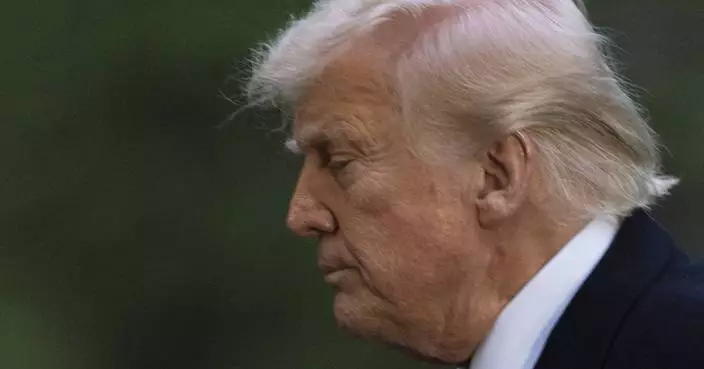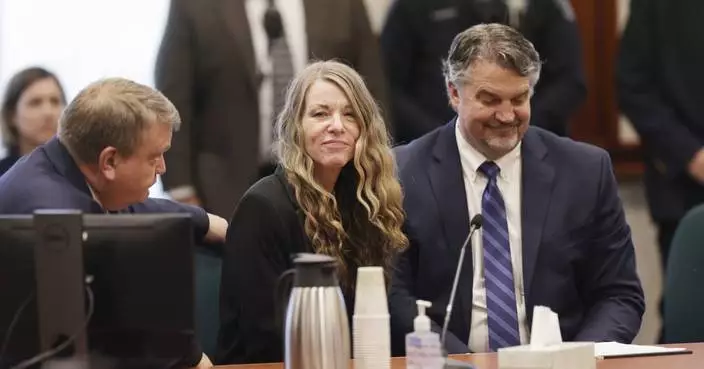WASHINGTON (AP) — Democratic Sen. Cory Booker ended his record-setting speech the same way he began it, more than 25 hours earlier: by invoking the words of his mentor, the late congressman and civil rights icon John Lewis.
“He endured beatings savagely on the Edmund Pettus Bridge, at lunch counters, on freedom rides. He said he had to do something. He would not normalize a moment like this,” Booker said of Lewis' work as a young activist during the Civil Rights movement. “He would not just go along with business as usual.”
"He said for us to go out and cause some good trouble, necessary trouble, to redeem the soul of our nation,” Booker said.
A break from “business as usual” was what Booker had in mind as he performed a feat of political endurance, holding the Senate floor for 25 hours and 5 minutes while delivering a wide-ranging critique of President Donald Trump and his policies.
In doing so, Booker of New Jersey broke the record for longest Senate floor speech, a mark that had belonged for decades to Strom Thurmond, the avowed segregationist from South Carolina who filibustered the Civil Rights Act of 1957. Booker said he'd been aware of Thurmond's record since first coming to the Senate in 2013 — a room near the Senate chamber is still named for him — and it bothered him.
“It seemed wrong to me," Booker said. "It always seemed wrong.”
Booker, a Black progressive, spoke about his roots as a descendant of both slaves and slave-owners as he invoked the Civil Rights movement, implicitly linking Lewis' steadfast resistance to Jim Crow to the modern-day opponents of Trump’s reshaping of government and society.
Throughout his speech he read letters from Americans about the impact that Trump's agenda is having on their lives, drawing historical parallels and warning that the country faces a “looming constitutional crisis.”
“This is a moral moment," Booker said. "It’s not left or right; it’s right or wrong.”
As Booker held the floor, dozens of members of the Congressional Black Caucus flanked the back of the Senate chamber in support, including House Minority Leader Hakeem Jeffries and Rep. Maxine Waters. Other CBC members kept close to the floor, including Sens. Angela Alsobrooks, Lisa Blunt Rochester and Raphael Warnock.
Before Booker surpassed Thurmond’s 68-year-old record, Jeffries said Booker's speech was “an incredibly powerful moment ... because he is fighting to preserve the American way of life and our democracy. And the record was held by Strom Thurmond who was actually defending Jim Crow segregation.”
Rep. Hank Johnson, D-Ga., a close friend of Lewis who represented the neighboring district in metropolitan Atlanta, said Booker’s speech was “an act of resistance.”
“The American people want to see us as their representatives do everything we can to resist the encroachment on our liberties and the taking away of benefits,” Johnson said.
Booker's speech captured attention at a time when Democrats have grown frustrated and despondent at their inability to stop Trump’s plans. Locked out of power in Congress and the executive branch, Democrats have struggled with how to take on Trump and the slashing of government being carried out by Elon Musk and his Department of Government Efficiency.
Grassroots liberal organizers have been urging major Democratic figures to take a more combative approach. Some hoped that Booker’s speech would offer the party lessons going forward.
Booker “is reminding all of America and his own party, not simply to stand for what we’re against, but to stand up for what we believe in,” said Brittany Packnett Cunningham, an activist who helped lead the 2014 protests against police brutality in Ferguson, Mo.
"I think he recognized that people are looking for our leaders to have the moral clarity to declare that what’s happening is wrong, and to determine, to do something about it,” she said.
As Booker's marathon speech drew to a close, he recalled the last conversation he ever had with Lewis, who was known for his acts of civil disobedience in Congress throughout his career until his passing in 2020.
Booker recalled telling Lewis, "we’ll do everything possible to make you proud.” And he said he had no doubt what Lewis' message would be if he were alive today.
"John Lewis would say, do something,” Booker said.
“He wouldn’t treat this moral moment like it was normal.”

In this image provided by Senate Television, Sen, Cory Booker, D-N.J. speaks on the Senate floor, Tuesday morning, April 1, 2025. (Senate Television via AP)
Hours before college basketball crowns its next champion, the future of college sports will be hanging in the balance in a California courtroom.
U.S. District Judge Claudia Wilken's scheduled hearing Monday in a courtroom in Oakland is expected to be the last one before the changes will truly begin under an industry-changing, $2.8 billion settlement of a 5-year-old lawsuit against the NCAA and the nation's largest conferences. Among other things, it will clear the way for schools to share up to $20.5 million each with their athletes.
Wilken already has granted preliminary approval for the settlement. It was unknown whether she will give final approval at Monday's hearing, which is expected to include testimony from some of those objecting to details of the sprawling plan. LSU gymnast and influencer Olivia Dunne is among the 18 people scheduled to testify, though she is expected to appear via Zoom.
The new structure outlined by the settlement, which represents a shift in billions of dollars from the schools into the pockets of athletes, is supposed to go into effect on July 1.
Universities across the country have been busy making plans, under the assumption Wilken will put the terms into effect.
“We're going to have a plan going into July 1, then we're probably going to spend the next year figuring out how good that plan is and how we need to modify it going forward,” said Florida athletic director Scott Stricklin, whose department is among the biggest in the country and includes a Gators men's basketball team playing for the national title Monday night against Houston.
The so-called House settlement, named after Arizona State swimmer Grant House, actually decides three similar lawsuits that were bundled into one. The defendants are the NCAA and the Southeastern, Big Ten, Atlantic Coast, Big 12 and Pac-12 conferences, all of whom have been touting the settlement as the best path forward for their industry.
“It's a huge step forward for college sports, especially at the highest level," said NCAA President Charlie Baker, whose organization continues to seek antitrust protections from Congress. “My biggest problem with the way the whole thing works right now is the schools have been removed from the primary relationship with the student-athletes.”
The most ground-shifting part of the settlement calls on schools from the biggest conferences to pay some 22% of their revenue from media rights, ticket sales and sponsorships — which equals about $20.5 million in the first year — directly to athletes for use of their name, images and likeness (NIL).
Still allowed would be NIL payments to athletes from outside sources, which is what triggered the seismic shift that college sports has endured over the last four years. For instance, Cooper Flagg of Duke reportedly makes $4.8 million in NIL deals from groups affiliated with the school and others.
The settlement calls for a “clearinghouse” to make sure any NIL deal worth more than $600 is pegged at “fair market value." It's an attempt to prevent straight “pay for play” deals, though many critics believe the entire new structure is simply NIL masquerading as that.
Another key element is the $2.8 billion in back damages to athletes who played sports between 2016 and 2024 and were not entitled to the full benefits of NIL at the time they attended schools. Those payments are being calculated by a formula that will favor football and basketball players and will be doled out by the NCAA and the conferences.
The settlement also calls for replacing scholarship limits with roster limits. The effect would be to allow every athlete to be eligible for a scholarship while cutting the number of spots available.
There will be winners and losers under such a formula, though some fear it could signal the end of the walk-on athlete in college sports and also imperil smaller sports programs that train and populate the U.S. Olympic team.
AP college sports: https://apnews.com/hub/college-sports

Florida's Alijah Martin (15) dunks the ball against Auburn during the second half in the national semifinals at the Final Four of the NCAA college basketball tournament, Saturday, April 5, 2025, in San Antonio. (AP Photo/Eric Gay)

UConn center Jana El Alfy (8) and UConn guard Paige Bueckers (5) react during the first half of a national semifinal Final Four game against UCLA during the women's NCAA college basketball tournament, Friday, April 4, 2025, in Tampa, Fla. (AP Photo/Chris O'Meara)

Auburn guard Tahaad Pettiford (0) moves on the court against Michigan State during the second half in the Elite Eight of the NCAA college basketball tournament, Sunday, March 30, 2025, in Atlanta. (AP Photo/Brynn Anderson)




















































